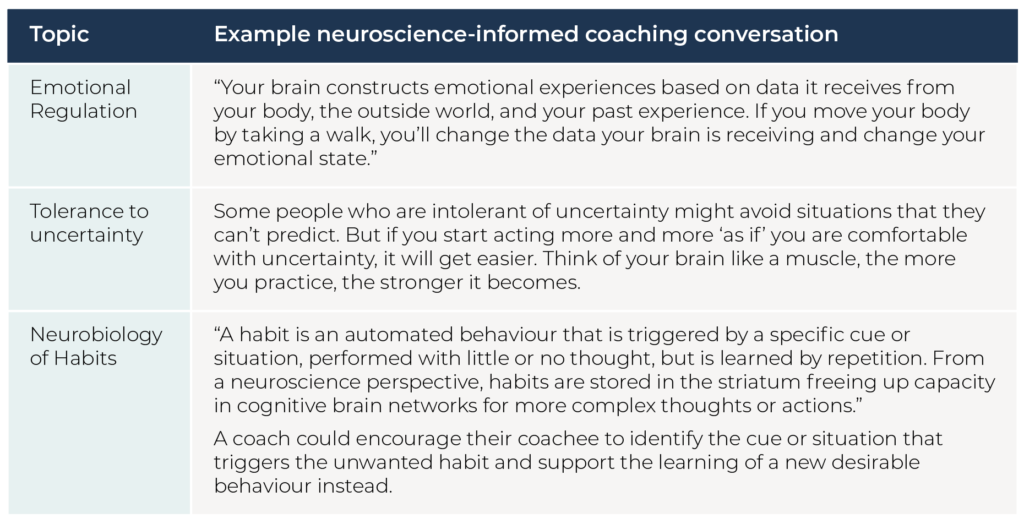Busting the “Lizard Brain” Myth: How to Use Neuroscience (Correctly) to Unlock Potential
Neuroscience can provide a valuable lens for any coaching conversation.
By better understanding the science of the brain – and how its neurology influences behaviour, coaches can – in theory – develop more targeted and effective approaches that can help accelerate outcomes.
In practice, however, incorporating neuroscience in coaching can be problematic.
In this article, neuroscientist, Dr. Sarah McKay explains the dos and don’ts for coaches and leaders.
Opportunities for Neuroscience-Informed Coaching
The integration of neuroscience into a coaching conversation offers several opportunities for leaders and coaches:
Busting neuro-myths
Neuroscience has become a cultural trope, with the increased visibility of neuroscience research resulting in a “seductive allure” where neuroscientific explanations are used to explain complex human behaviour. These ‘neuro-myths’ are common in popular and business writing, and coaches are not immune from the enduring popularity of these myths – including:
- the existence of learning styles
- that physical exercises can integrate brain hemispheres
- that women are better at multi-tasking because they have a thicker corpus callosum
- the existence of the “lizard brain”
- the trope that we only use 10% of our brains
The persistence of neuro-myths is attributed to various factors, including their seductive appeal and confirmation bias.
The opportunity for leaders and coaches is to not only incorporate research-based science into their coaching, but also to provide accurate information to their coachees.
Developing a ‘what’ and ‘how’ framework to integrate neuroscience into coaching practice
Coaches and leaders could leverage neuroscience in two ways – sharing information about the science itself, and also using neuroscience-informed delivery (like storytelling) designed to engage the coachee.

Development of neuroscience-informed content for coaching conversations:
Neuroscience research can provide valuable insights into the factors that influence behaviour, such as motivation, emotion, and cognition.
By incorporating this knowledge into coaching conversations, coaches and leaders can help their coachees better understand their thoughts, feelings, and behaviours and develop strategies for achieving their goals.

There is an exciting opportunity to validate coaching efficacy in the future: using neuroimaging techniques, researchers could test how coaching “works” and identify the neural mechanisms underlying its effectiveness.
Until that day here are some reflection questions for coaches and leaders to stress-test how you are using neuroscience in your coaching:
Do emerging insights from neuroscience provide new practical and actionable approaches to coaching. Do they add explanatory power, or are they merely ‘interesting’ or ‘seductive’?
What neuroscience-informed content, tools or techniques do you already use in your coaching conversation?
Where or who do you source your neuroscience information from?
Author: Dr Sarah McKay, Director, The Neuroscience Academy. Neuroscientist, speaker, author, media personality and founder of Think Brain and the Neuroscience Academy suite of training programs.









